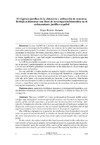Identificador persistente para citar o vincular este elemento:
https://accedacris.ulpgc.es/jspui/handle/10553/57512
| Campo DC | Valor | idioma |
|---|---|---|
| dc.contributor.author | Romeo Malanda, Sergio | en_US |
| dc.date.accessioned | 2019-10-29T13:58:35Z | - |
| dc.date.available | 2019-10-29T13:58:35Z | - |
| dc.date.issued | 2011 | en_US |
| dc.identifier.issn | 0423-4847 | en_US |
| dc.identifier.other | Dialnet | |
| dc.identifier.uri | https://accedacris.ulpgc.es/handle/10553/57512 | - |
| dc.description.abstract | La Ley 14/2007 de 3 de Julio, de investigación biomédica (LIB), reconoce que la investigación biomédica y las ciencias de la salud son instrumentos esenciales para mejorar la calidad y la esperanza de vida de las personas, y para incrementar su bienestar. De forma específica enfatiza que la obtención, el uso y la cesión de muestras biológicas con fines diagnósticos y de investigación ha aumentado de forma significativa, y que han surgido incertidumbres éticas y jurídicas que han de ser debidamente reguladas. La LIB ha pretendido responder a los retos que la investigación biomédica plantea en general y particularmente en relación con las muestras biológicas humanas, a la vez que pretende garantizar la protección de los derechos de las personas que podrían verse vulnerados. En este artículo, el autor analiza los aspectos legales relativos a la obtención, uso y cesión de muestras biológicas en investigación biomédica. Lógicamente, el marco jurídico pivota en torno al consentimiento del sujeto fuente y en la información que debe haber sido proporcionada previamente a este respecto. Admitiendo que existe una divergencia entre la concesión de consentimientos completamente genéricos y específicos sobre el destino posterior de las muestras, la Ley ha optado por una opción intermedia y flexible. | en_US |
| dc.description.abstract | The Law 14/2007 of 3 July on Biomedical Research (LBR) acknowledges that biomedical research and health sciences are key tools to improve the quality of life and life expectancy of people and increasing their well being. Specifically, it emphasises that the collection, use and transfer of biological samples for diagnostic and research purposes has increased significantly, and that ethical and legal uncertainties have been created that have to be properly regulated. The LBR has attempted to respond to the challenges that biomedical research raises in general and particularly in relation to human biological samples, and at the same time guarantee the protection of the rights of individuals who could be affected. In this article, the author analyses the legal aspects related to the collection, use and transfer of biological samples in biomedical research. Logically, the legal framework depends upon the consent of the source of the samples and on the previous information that must be provided in this regard. Recognising that there is a divergence between the grant of completely generic or specific consent on the use or latter uses of the sample, the Law has chosen an intermediate and flexible option. | en_US |
| dc.language | spa | en_US |
| dc.relation.ispartof | Estudios de Deusto | en_US |
| dc.source | Estudios de Deusto: revista de la Universidad de Deusto [ISSN 0423-4847], v. 59 (1), p. 183-228 | en_US |
| dc.subject | 560505 Derecho penal | en_US |
| dc.subject.other | Materiales biológicos humanos | en_US |
| dc.subject.other | Investigación biomédica | en_US |
| dc.subject.other | Consentimiento informado | en_US |
| dc.subject.other | Estudios de diversidad genética | en_US |
| dc.subject.other | Comités de Ética de la Investigación | en_US |
| dc.subject.other | Human biological material | en_US |
| dc.subject.other | Biomedical research | en_US |
| dc.subject.other | Informed consent | en_US |
| dc.subject.other | Studies of genetic diversity | en_US |
| dc.title | El régimen jurídico de la obtención y utilización de muestras biológicas humanas con fines de investigación biomédica en el ordenamiento jurídico español | en_US |
| dc.type | info:eu-repo/semantics/article | en_US |
| dc.type | Article | en_US |
| dc.identifier.url | http://dialnet.unirioja.es/servlet/articulo?codigo=3701685 | - |
| dc.description.lastpage | 228 | - |
| dc.identifier.issue | 1 | - |
| dc.description.firstpage | 183 | - |
| dc.relation.volume | 59 | - |
| dc.investigacion | Ciencias Sociales y Jurídicas | en_US |
| dc.type2 | Artículo | en_US |
| dc.contributor.authordialnetid | 74150 | - |
| dc.identifier.dialnet | 3701685ARTREV | - |
| dc.identifier.ulpgc | Sí | es |
| item.grantfulltext | open | - |
| item.fulltext | Con texto completo | - |
| crisitem.author.dept | GIR IUIBS: Medio Ambiente y Salud | - |
| crisitem.author.dept | IU de Investigaciones Biomédicas y Sanitarias | - |
| crisitem.author.dept | Departamento de Derecho Público | - |
| crisitem.author.orcid | 0000-0002-9414-451X | - |
| crisitem.author.parentorg | IU de Investigaciones Biomédicas y Sanitarias | - |
| crisitem.author.fullName | Romeo Malanda, Sergio | - |
| Colección: | Artículos | |
Visitas
210
actualizado el 15-ene-2026
Descargas
113
actualizado el 15-ene-2026
Google ScholarTM
Verifica
Comparte
Exporta metadatos
Los elementos en ULPGC accedaCRIS están protegidos por derechos de autor con todos los derechos reservados, a menos que se indique lo contrario.
